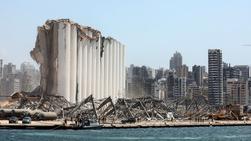 Damaged grain silos from the blast at the Port of Beirut, Aug 8, 2020. (PHOTO / BLOOMBERG)
Damaged grain silos from the blast at the Port of Beirut, Aug 8, 2020. (PHOTO / BLOOMBERG)
CAIRO - The World Health Organization (WHO) said on Wednesday it had appealed for $76 million in aid for Lebanon after last week’s massive explosion in Beirut destroyed or damaged hospitals, clinics and medical supplies.
The blast put three hospitals out of operation and has left three others working at partial capacity, reducing the number of beds in public and private hospitals by 500-600, WHO officials told an online press conference
Lebanon was already struggling with a financial crisis and a rise in the number of new coronavirus cases before the Aug. 4 explosion in the capital’s port area that left at least 171 dead and injured some 6,000.
The blast put three hospitals out of operation and has left three others working at partial capacity, reducing the number of beds in public and private hospitals by 500-600, WHO officials told an online press conference.
READ MORE: Lebanese government resigns amid fury over Beirut blast
“A week after the blast, the World Health Organization is still concerned about the health and wellbeing of people who were injured, lost loved ones, or became homeless, and it’s expected (that) recovery from the psychological pain from the blast will last much longer,” said Rana Hajjeh, WHO’s regional programme director.
“In particular, we are concerned about the return of COVID-19 in Lebanon. We have launched an appeal for US$76 million, and ask the international community to support the Lebanese people and show solidarity with them in every way possible.”
The loss of hospital beds had “clear implications for the management of COVID as well as other medical conditions”, said Richard Brennan, WHO’s regional emergency director.
ALSO READ: Death toll from Beirut explosions rises to 171
Initial results from an assessment of 55 primary healthcare clinics and centres across Beirut showed just over half are not functioning, with the remainder functioning at varying levels, Brennan said.
The WHO has so far brought in 25 tonnes of personal protective equipment (PPE), distributed trauma and surgical supplies to 2,000 patients at 10 hospitals, and is working with at least 11 emergency medical teams that have arrived from overseas, officials said.


